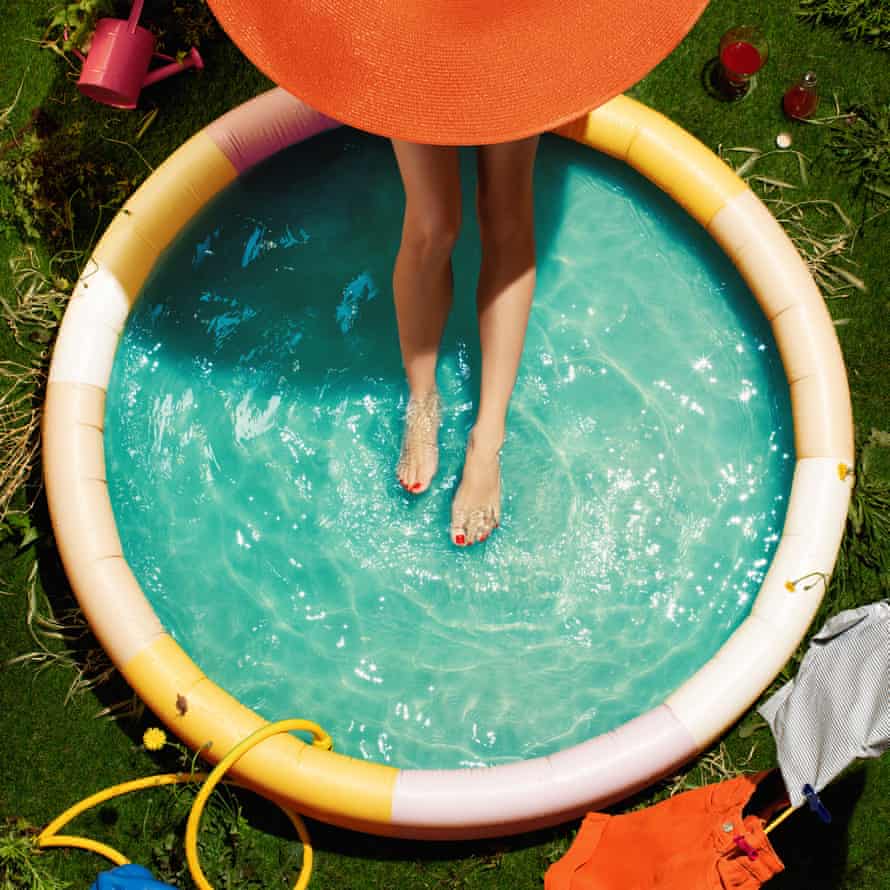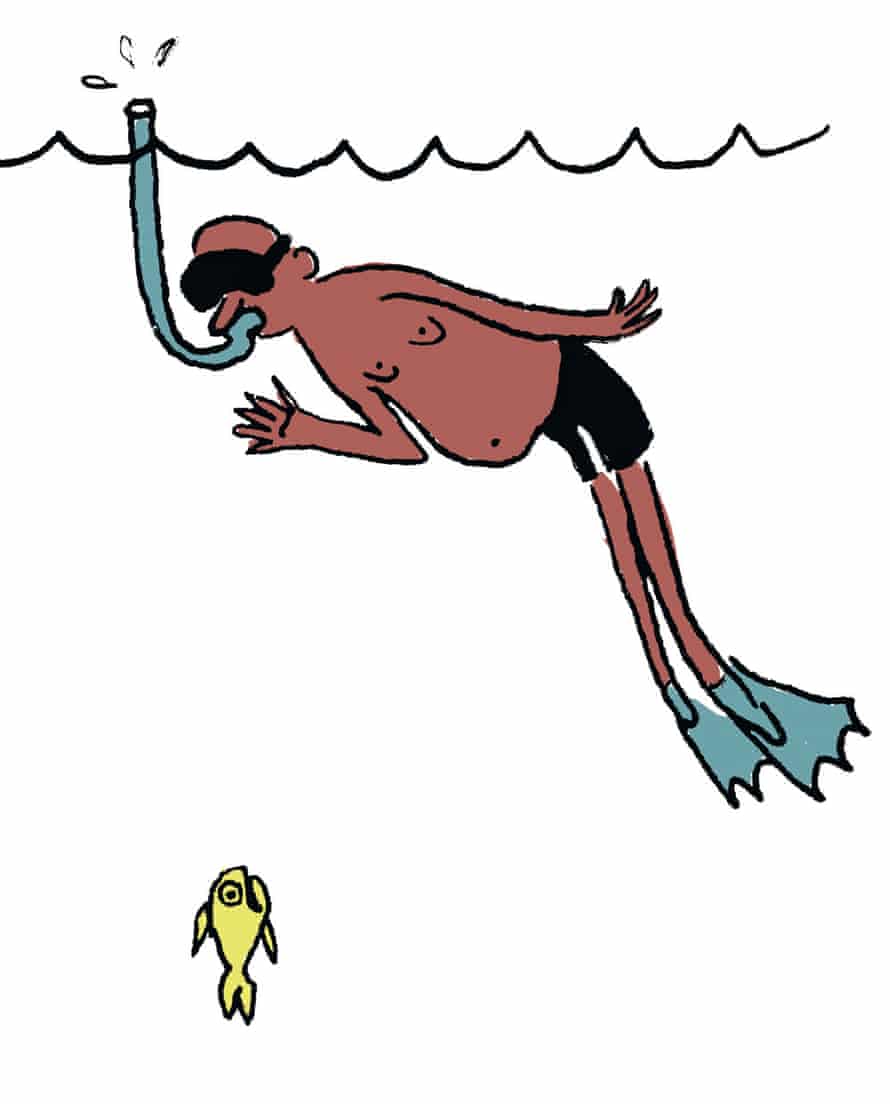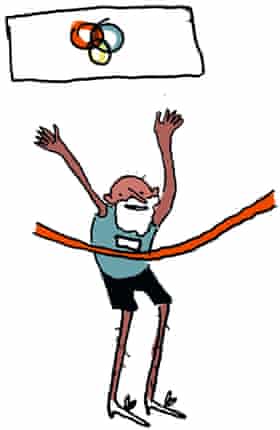From sundae stations to snorkel trails – 30 ideas for cheap fun this summer
A great summer doesn’t need to cost a fortune – or anything, in fact. All you need is our wallet-friendly guide

1 Take a plot twist
Elevate your summer reading by meeting up with friends in an outdoor location for a “wild read”. Or try the method-reading approach: leaf through On Chesil Beach on Chesil beach, or dip into Tom’s Midnight Garden in the garden after dark. Or recreate a meal from literature; unless you have the kitchen skills of Auguste Escoffier, maybe start with an author such as James Salter, the king of breezy beach picnics and dinner parties, or go back to basics with a week of snacky, Hungry Caterpillar-inspired lunches.
2 Nominate a Freaky Friday
Set a budget, then put the children (either your own or a niece/nephew/godchild) in charge for the day: let them decide what you wear, what you eat, where you go, what you do and, crucially, how the group kitty is spent. If you’re not altogether on board with unleashing chaos, you can always set a few ground rules first, or identify the usual organiser in the household and hand the decision-making to another grownup for a day to mix things up.
3 Do a charity-shop challenge
Decide on a set amount that everyone can afford, then let family or friends loose on the local charity shops and see who lays claim to the best buy. To make things more interesting, give each participant a specific person they should buy for. If the recipient likes what they’re given, they can keep it. If not, their gift can be donated back with no hard feelings – a win for good causes, too.
4 Plan a breakfast picnic
Lunch is the obvious time for eating outside, but you’re missing a trick by not going earlier. Set off in time for sunrise (or soon afterwards if you’re not a natural lark) and even a humble cuppa sipped on a rug can feel like landing in Narnia. The other big benefit of breakfast picnics is they’re easier to transport than lunch or dinner. Aim for a high – or green – spot and listen to the dawn chorus as you tuck into smoked salmon and cream cheese bagels, pots of yoghurt and fruit, or cups of steaming coffee and wedges of good solid seed cake.

5 Visit a farm
This year is a big one for city farms, marking 50 years since the UK’s first such project opened, in London’s Kentish Town. There are now more than 50 of these community-focused farms across the UK, each one offering local people opportunities to meet animals, volunteer, join wellbeing programmes and enjoy nature trails, workshops and other family-friendly activities. Most city farms are open by donation; to find your nearest one search the Social Farms & Gardens website. In the countryside, look out for LEAF Open Farm Sunday on 12 June. A huge range of farms participate in this; check the website to find out what’s on in your area. Entrance is generally free with add-on activities charged separately.
6 Watch a night glow

Summer is peak hot-air balloon season. The magic that hits when you glimpse one is magnified at a balloon festival, when tens or even hundreds of them ascend together. From Longleat’s glitzy Sky Safari in Wiltshire, to the charity-focused Oswestry Balloon Carnival in Shropshire and the all-singing, all-dancing Bristol International Balloon Fiesta, there are a surprising number of them across the UK in the summer (you can find a list on the British Balloon and Airship Club’s website. Most offer free entry, although you might have to pay for food stalls and other entertainment. Often the magic isn’t to be found close up, though, but from a nearby hillside. Pack a rug and some snacks, and lie back as the spectacle unfolds. The mass takeoffs happen at dawn and after dark (hence the “night glow” label).
7 Give the toys a day out
If you’re stuck at home with very young children and have a garden, change the pace by moving their indoor toys outside for the day and letting them discover them anew in a safely shady spot. Set up a theme to get them started – the sandpit can become a beach, a washing-up bowl can stand in as a teddy swimming pool. If you’ve got a play kitchen, carry it outside for a “barbecue” party; if they normally do art and craft inside, take the chalks out and let them doodle on the patio or balcony.
8 Go car-booting
If you haven’t discovered the joy of car-booting from a seller’s perspective, this summer might be the time to start. Setting off at sunrise with a fully loaded boot is only part of the adventure. The rest is chatting to customers and fellow stallholders; the buzz of negotiating a good price; getting to clear the house and return to it with a fatter wallet. Don’t take it too seriously, don’t set your prices too high, and enjoy escaping the rigmarole of selling on eBay.
9 Try a dice walk
A simple way to get everyone out of the house and exploring new ground: start at your front door and take turns to throw a dice. If it lands on an even number, turn left; if it lands on an odd number, turn right, and see where it takes you. To make things slightly more complex, assign an instruction to every number: straight on, do a U-turn, jog to the next junction or walk as slowly as you can.
10 Challenge yourself
Jazz up free activities by setting challenges around them. Compete with friends or family to learn a new language on Duolingo; download the charitymiles.org app and earn donations for every mile you walk, run or cycle; have an analogue-only day; carry out a two-minute beach clean or litter-pick in your area; or get to grips with the stopwatch on your phone and start timing everything, from which child can be quiet the longest to who can do the most press-ups in a minute.
11 Follow a grown-up treasure hunt

Another way to turn an amble into an adventure is to download one of the Milestone Society’s many free local heritage walks . A charity that works to conserve ancient signposts and milestones around the country (among them, 117 dating back to the Romans), its pdf walking guides hop from milestone to milestone. Tracking down these roadside markers is like following a grown-up treasure hunt; many are humble works of art, hidden in dusty verges and maintained by an intrepid band of volunteers.
12 Go on a playground crawl
A good local playground is a summer holiday godsend, but a playground crawl is even better. Children love trying out new ones and, for parents, it breaks up the tedium of returning to the same spot again and again. Make a day of it and plot a circular route, getting the kids to score each destination to determine a winner. It’s more about novelty than snazzy play equipment, but if you live in an area with lots of choice, mix it up with adventure playgrounds, outdoor gyms, traditional play parks and simple spaces with just a rope swing in the woods.
13 Have a stargazing campout
Choose a clear night and, if you have a garden, set up camp for a sleep-out. If you don’t have your own tent, there’s no need to buy one; either make a duvet den with rugs, quilts, pillows and blankets, or hire your canvas through peer-to-peer rental company Tentshare. If the forecast’s looking promising, time your campout to coincide with the supermoon on 13 July. Late summer, especially around the new moons on 28 July and 27 August, is also a great time to see the Milky Way.
14 Create a kitchen-cupboard gallery
Polish your artistic skills by setting off on a one-day sketching safari around your favourite (free) local art galleries. Draw something at each one, then make a kitchen-cupboard gallery wall at home with your masterpieces. If you’re a practised artist, you may want to use more sophisticated materials but even a piece of paper and a ballpoint pen will do. Nor does it have to be limited to galleries if you’re a plein air kind of person. Pick your theme – gardens, beaches, canals, your street – and then go it alone, with friends or with an organised group such as SketchCrawl.
15 Swim a snorkel trail

With the boom in wild swimming, many of the country’s better-known bathing spots are packed on sunny days. If you live close to the sea, try one of the UK’s snorkel trails instead, and you’ll find serenity as well as sea life. In Scotland these are impressively well organised, with the Scottish Wildlife Trust’s website including free downloadable guides to six official snorkel trails, along with useful safety advice. There are plenty of others, though, from Kimmeridge Bay in Dorset to Sheringham in Norfolk; a quick web search will bring up recommended spots around the coastline.
READ RELATED: A Lower Back Workout to Strengthen Your Entire Core
16 Be a citizen scientist
This is a win-win: you get to spend time doing something fun while the wildlife surveys you carry out can help safeguard the species you’re monitoring. Expert knowledge is rarely needed. There’s a long list of current UK projects on Countryside Jobs Service, but one of the loveliest is the Big Butterfly Count. From 15 July to 7 August, download a free species ID chart, pick a location, then set a timer for 15 minutes and record the number and type of butterflies (and day-flying moths) you spot. Better still, download the free Big Butterfly Count app and keep counting in 15-minute intervals while you’re out and about.
17 Pedal differently
When you’re trying to stretch your holiday budget, getting extra mileage out of existing possessions or skills is useful. Take cycling. Get your friends or family together and compete in a slow cycling race – the winner is the slowest pedaller, which is trickier (and funnier) than it sounds. Or grab a willing partner and hire a tandem. It isn’t free (though if you have a disability you might qualify for free hire through specialist operator Charlotte’s Tandems, but at roughly £30-40 for a half-day, split between two, you don’t need to be Jeff Bezos to give it a go. For a list of tandem hire operators, see the Tandem Club’s website.
18 Set forth on a doorstep expedition
Make this summer the one in which you actually visit the sights you have on your doorstep. Take a local bus and get off at a stop you’ve never disembarked at before. Head out on a footpath across an unfamiliar field. Cycle along the railway track turned bike path you’ve been meaning to pedal but haven’t. Buy a day-rover bus or train ticket and see how far you can get within a given time. Or go wild and make for the suburbs if you’re usually a city-centre junkie.
19 Try a new sport

If Wimbledon has you reaching for a racket, Cowes Week dreaming of the high seas or the Commonwealth Games hurdling over the garden gate, follow those impulses and give a new sport a go. Many local tennis, athletics and other sporting clubs hold free taster sessions. If that sounds too energetic, the Canal & River Trust hosts free introductory Let’s Fish! events across its network between March and October. Or, if you live near a marina, follow the advice of travel bloggers Emily and Adam of twogetlost.com and learn how to sail for free by crewing on someone else’s boat.
20 Make a wind-chime time capsule
Spend the holidays collecting flotsam and jetsam – tarnished keys from old cabinets, mini disco balls, hair clips, lost jigsaw pieces, retro train tickets, tiny toys from children’s party bags, miniature racing cars, feathers, shells – then hang your finds, with wire or thread, from a stick or hoop to make a mobile. Then hang this, with ribbon or stronger twine, from a hook or tree branch to remind you of summer 2022. Or make a mobile from scavenged dried flowers and grasses, but hang indoors to keep its fragile blooms protected.
21 Go wild
Each June the Wildlife Trusts encourage us Britons to embrace the natural world through its #30DaysWildCampaign – an annual challenge to do one wild thing every day of the month. Order a free information pack through wildlifetrusts.org and they’ll send out wildflower seeds, instructions on how to play “sensory bingo” and more. Many of the regional trusts are running free, or low-cost, pond-dipping sessions, nature trails and other activities as part of the campaign’s Big Wild Weekend (18 and 19 June); these range from outdoor mindfulness sessions in Northumberland to Somerset’s Big (wildlife) Count. Nature-lovers in Wales can join “bioblitzes” and other free wildlife activities during Wales Nature Week, 2-10 July.
22 Ride a magic carpet
Can’t afford to go abroad this year? Travel vicariously by choosing a destination and spending the day in armchair-tourist mode. Do some research, then delve into whatever piques your interest – cook a classic dish or cake from your chosen locale, put on the subtitles and watch an original-language film based there, borrow a relevant book from the library, explore local museums and galleries via Google Arts & Culture, research local sports or tune into one of its music stations on Radio Garden. Start with an easy one such as Paris, breakfasting on croissants while tuned into TSF Jazz, before building up to more adventurous terrain, such as Dakar or Svalbard.
23 Set up a sundae station
If there’s one thing most kids like even more than ice-cream, it’s a DIY sundae station. Set up a tray with bowls of chopped fruit, nuts (if you’re allergy-free), sprinkles, Smarties, popcorn, wafers, chocolate fingers, pretzels, or whatever floats your children’s boats, then scoop out vanilla ice-cream or frozen yoghurt (stick to this one basic flavour to stretch your budget) and let them add their own toppings. Cheaper and easier to organise than a full-blown dinner or drinks party, an ice-cream social is also a good way to get adult friends together on hot days. Serve in waffle cones or your prettiest bowls, and go for grown-up toppings: shards of honeycomb, candied nuts, splinters of brittle, frozen blueberries or shavings of toasted coconut.
24 Make a summer advent-ure calendar
Use the ideas in this list, or add and subtract other activities to suit your own situation, then write them down on separate scraps of paper and fold them up. If you have one of those fabric Advent calendars, with pockets for different days, dig it out and slip your activity ideas in before drawing them out day by day through the holidays. If not, make it a summer activity lucky dip, tipping the pieces of paper into a bowl and fishing one out when inspiration fails to strike.
25 Host a sports day at home

Stage a home Olympics in the garden, or at the local park, with a circuit of challenges against the clock with family or friends. Depending on the ages of the competitors, this could be anything from nailing 50 press-ups to shooting a single basketball hoop or completing five star jumps on a trampoline; you’ll need at least 10 to make it an event (the sillier, the better, in most cases). Prizes are essential, and you can adapt the activities to suit your interests: stage a home Wimbledon with bats and balls, or make it a DIY triathlon with a bike ride to the local pool, a few laps in the water, then a jog around the block.
26 Turn the neighbourhood inside out
Peek behind the scenes in your neighbourhood this summer via an open doors event. The main Open House, Doors Open Days and Heritage Open Days take place in September but many other artists’ open studios and open garden events happen in the summer, and they’re a great way to see what’s normally only glimpsed at behind walls or over fences. Surrey (surreyopenstudios.org.uk), Cockpit in London (cockpitstudios.org) and North Yorkshire (nyos.org.uk) are three of many artists’ open studios events across the country, or search for private garden openings on ngs.org.uk and community ones on farmgarden.org.uk. Several allotments also open their gates during August’s National Allotments Week (nsalg.org.uk). Don’t stop there, though. Fire stations, lighthouses and even some quarries host open days and admission is usually free or by donation.
27 Upcycle your skills
Helping others might seem a purely altruistic activity but, from giving us purpose to fostering community, it can boost our own wellbeing, too. If you haven’t volunteered before, the first week of June is an excellent time to start as it’s Volunteers’ Week, a nationwide celebration of the country’s unpaid helpers. You could just choose a cause close to your heart and offer help where it’s needed most, but a better strategy is putting existing skills to use. Love animals? Muck in at a local animal sanctuary. Have a way with people? Offer to support refugees, or befriend the elderly. Know your onions? Volunteer for the cooking rota at a community kitchen. Not a front-of-house type? Many charities need volunteer drivers and letter-writers.
28 Go forest bathing
The Japanese concept of shinrin-yoku – bathing the mind and body in green space for wellbeing – has gone mainstream over recent years. For many people that means walking, meditating or listening to nature from the sanctuary of a peaceful woodland glade, but there are many other ways to give it a go. If you have a noisy household, take a chair outside to snatch a quiet moment among the seedlings. No access to green space? Burn some pine- or eucalyptus-scented essential oil (or put a few drops in a bath), play some calming woodland or waterfall sounds, and close your eyes for a moment of sylvan headspace.
29 Go barefoot
Kneipp therapy is an idea that was developed by the Bavarian-German priest Sebastian Kneipp in the 19th century, centred around paddling through different temperatures and pressures of water. Now a central component of many spas across Germany, Switzerland and Bavaria, a variation on the theme also exists in the UK, in the form of barefoot trails. Here, they tend to be more about enjoying the sensations of different textures underfoot (think grass, sand, leaves, pebbles, woodchip or rockpools) in the hope of invigorating the body and calming the mind. Many outdoor attractions now include official barefoot trails, mostly designed for children, but it’s easy enough to make your own. Start in the local park or at the beach (even the back garden will do), identify a circuit of different textures to tread your way gracefully across, then unlace your shoes and set your feet loose. For the full Alpine spa experience, take a towel and some water to rinse your feet with and, if you have kids or a partner in tow, give each other a foot massage to boot.
30 If all else fails … nominate a do-nothing day

Stop. Relax. Put down that snorkel. Lock up that tandem. Snooze the alarm clock and take a deep breath. For one day you have permission to do nothing. Not literally nothing, of course – where would the fun be in that? But if you’re dreaming of a day without WhatsApp, Google Calendar or back-to-back meet-ups, this is your chance. Want to stay in bed all day and watch Netflix? Cool. Soak in the bath until your thumbs look like walnuts? Fine, too. Curl up with the latest Jack Reacher and a packet of Hobnobs? A summer do-nothing day is the answer.
Main image model: Hayley at Hired Hands Models
Source: Health & wellbeing | The Guardian





